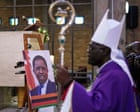
In recent news, two distinct legal matters have drawn significant attention on the global stage, engaging the legal systems of Zambia, Costa Rica, and the United States. These cases highlight the intricacies of international legal processes and the broader implications for justice and human rights.
In Zambia, a dramatic halt to the funeral of former President Edgar Lungu unveiled the ongoing tensions within the nation’s political fabric. As mourners gathered at the Cathedral of Christ the King in Johannesburg, proceedings were unexpectedly halted due to a high court ruling. The court order came at the request of Zambia’s attorney general, reflecting a continuation of the political friction between Edgar Lungu and his successor, President Hakainde Hichilema. The legal halt was the latest episode in a long-standing feud between the two leaders, manifesting not just during their political careers but extending into the period following Lungu’s passing. This development underscores the enduring impact of political dynamics and the intricate balance required in state affairs, even posthumously.
Shifting focus to Costa Rica, a compassionate legal decision marked a victory for human rights advocates. The nation’s court ordered the release of approximately 200 migrants, including eighty children, who were detained after being deported from the United States. These individuals, hailing from diverse backgrounds including Afghanistan, Iran, and Russia, found themselves in a shelter following an agreement with the previous U.S. administration. The court’s ruling came shortly before a planned visit from the U.S. Secretary of Homeland Security, adding a layer of diplomatic sensitivity. It highlights Costa Rica’s commitment to upholding human rights standards and reflects broader regional challenges concerning migration policies and agreements.
Meanwhile, in the United States, legal proceedings took a decisive turn as an appeals court in New York ordered the return of Jordin Melgar-Salmeron from El Salvador. Deported less than 30 minutes after a court had expressly barred his removal, this case has drawn scrutiny regarding the compliance of government agencies with judicial mandates. The court required a detailed declaration on the current status and whereabouts of Melgar-Salmeron, signaling the judiciary’s role in ensuring governmental accountability. This ruling not only aims to rectify an individual injustice but also seeks to reaffirm the integrity of judicial oversight and the rights of those facing deportation.
These cases shed light on the complex interplay between legal decisions, human rights, and political environments across different nations. They exemplify both the challenges and responsibilities inherent in navigating legal frameworks to promote justice. As these situations evolve, they continue to invite reflection on how international and domestic legal systems can better serve individuals and uphold the principles of fairness and human dignity.
Source: {link}
